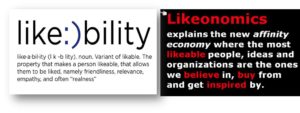
Everyone wants to be liked, and whilst popularity amongst peers might seem more fitting when describing a school yard, we are now know realising that likeability can be just as important in a work context. And whilst it’s important to get along with your colleagues, it’s the relationships with clients, suppliers and customers where this likeability factor is essential.
This may seem obvious, but I’ve had a few conversations recently with strong-minded, highly successful sales professionals who have lamented to me about complaints made against them from clients. It would seem that these potential clients were satisfied with the company, with the product, and with the price, yet were hesitant to do business because it would mean creating an ongoing relationship with sales people who, to put it frankly, the clients didn’t like.
So it got me thinking about whether having a great product/price/reputation is enough. From recent conversations, and from personal experience, I would confidently say that it’s not. That as well as having a great product or service, being liked is key to ensuring ongoing business. If clients feel happy to pick up the phone to have a chat, and feel comfortable to ask for further information, then you’re not only likely to have continued business, but you’re more likely to be recommended to other clients.
From a personal perspective, I spent many years booking entertainment for events, and the same rule applied. I would often choose the friendly, reliable and personable performers with less experience or a higher cost, over those who were undoubtedly the best at what they did, but were difficult to deal with. No matter how good an offering is, as soon as the transaction becomes stressful or difficult, this can often outweigh any benefit.
This isn’t to say you need to be a walkover, or be too nice, it’s all about cultivating and nurturing relationships. Acknowledging that different people do business differently and that sometimes your own standards, attitudes and timeframes won’t suit every customer. Take the time to know what’s important to each client and adapt to this. Take a break before responding to communication you may not like or agree with, and put ego aside.
Charlotte Beers, former chairperson and CEO of Ogilvy and Mather Worldwide says it well, in terms of the importance of relationships in addition to the quality of your work:
“You have to recognise that there will be a moment in time when you will not be able to be represented by the quality of your work, but rather by the relationships you have. Make as few enemies as possible. Here’s the bottom line: the person who is very good at relationships is the one who gets to be in charge.”




